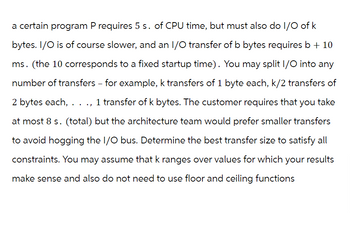
Database System Concepts
7th Edition
ISBN: 9780078022159
Author: Abraham Silberschatz Professor, Henry F. Korth, S. Sudarshan
Publisher: McGraw-Hill Education
expand_more
expand_more
format_list_bulleted
Topic Video
Question
Alert dont submit

Transcribed Image Text:a certain program P requires 5 s. of CPU time, but must also do I/O of k
bytes. I/O is of course slower, and an I/O transfer of b bytes requires b + 10
ms. (the 10 corresponds to a fixed startup time). You may split I/O into any
number of transfers - for example, k transfers of 1 byte each, k/2 transfers of
2 bytes each, . 1 transfer of k bytes. The customer requires that you take
at most 8 s. (total) but the architecture team would prefer smaller transfers
to avoid hogging the I/O bus. Determine the best transfer size to satisfy all
constraints. You may assume that k ranges over values for which your results
make sense and also do not need to use floor and ceiling functions
Expert Solution
This question has been solved!
Explore an expertly crafted, step-by-step solution for a thorough understanding of key concepts.
This is a popular solution
Trending nowThis is a popular solution!
Step by stepSolved in 3 steps with 11 images

Knowledge Booster
Learn more about
Need a deep-dive on the concept behind this application? Look no further. Learn more about this topic, computer-science and related others by exploring similar questions and additional content below.Similar questions
- Question 43 Select the appropriate response True or False: Most back injuries are due to improper removal and replacement of the ladder on the company truck. True O False Submit Responsearrow_forwardHashtags in Excel cells mean what?arrow_forwardMatch the Security Controls to the following (see attached photo) Unsupervised Lab Office Data Center Employee Latop You can only use the security controls once.arrow_forward
- Describe the purpose and usage of cookies in web development. How do they impact user experience and privacy?arrow_forwardPlease elaborate on the events that took place during the aforementioned security breach of the data.arrow_forward1. How do you present feature creep? (Maximum 2 pages)arrow_forward
- Can you create a complaint log for a housing community, including bldg number , name time date etc.arrow_forwardPlease refer to the attachment for the sceniro. Please answer the following question - paragraph on A clear description of the identity threats pertinent when using a SaaS solution.arrow_forwardSort the DNS zone file. Each illustration is explained. How often do domain names and email addresses change servers?arrow_forward
arrow_back_ios
SEE MORE QUESTIONS
arrow_forward_ios
Recommended textbooks for you
 Database System ConceptsComputer ScienceISBN:9780078022159Author:Abraham Silberschatz Professor, Henry F. Korth, S. SudarshanPublisher:McGraw-Hill Education
Database System ConceptsComputer ScienceISBN:9780078022159Author:Abraham Silberschatz Professor, Henry F. Korth, S. SudarshanPublisher:McGraw-Hill Education Starting Out with Python (4th Edition)Computer ScienceISBN:9780134444321Author:Tony GaddisPublisher:PEARSON
Starting Out with Python (4th Edition)Computer ScienceISBN:9780134444321Author:Tony GaddisPublisher:PEARSON Digital Fundamentals (11th Edition)Computer ScienceISBN:9780132737968Author:Thomas L. FloydPublisher:PEARSON
Digital Fundamentals (11th Edition)Computer ScienceISBN:9780132737968Author:Thomas L. FloydPublisher:PEARSON C How to Program (8th Edition)Computer ScienceISBN:9780133976892Author:Paul J. Deitel, Harvey DeitelPublisher:PEARSON
C How to Program (8th Edition)Computer ScienceISBN:9780133976892Author:Paul J. Deitel, Harvey DeitelPublisher:PEARSON Database Systems: Design, Implementation, & Manag...Computer ScienceISBN:9781337627900Author:Carlos Coronel, Steven MorrisPublisher:Cengage Learning
Database Systems: Design, Implementation, & Manag...Computer ScienceISBN:9781337627900Author:Carlos Coronel, Steven MorrisPublisher:Cengage Learning Programmable Logic ControllersComputer ScienceISBN:9780073373843Author:Frank D. PetruzellaPublisher:McGraw-Hill Education
Programmable Logic ControllersComputer ScienceISBN:9780073373843Author:Frank D. PetruzellaPublisher:McGraw-Hill Education

Database System Concepts
Computer Science
ISBN:9780078022159
Author:Abraham Silberschatz Professor, Henry F. Korth, S. Sudarshan
Publisher:McGraw-Hill Education

Starting Out with Python (4th Edition)
Computer Science
ISBN:9780134444321
Author:Tony Gaddis
Publisher:PEARSON

Digital Fundamentals (11th Edition)
Computer Science
ISBN:9780132737968
Author:Thomas L. Floyd
Publisher:PEARSON

C How to Program (8th Edition)
Computer Science
ISBN:9780133976892
Author:Paul J. Deitel, Harvey Deitel
Publisher:PEARSON

Database Systems: Design, Implementation, & Manag...
Computer Science
ISBN:9781337627900
Author:Carlos Coronel, Steven Morris
Publisher:Cengage Learning

Programmable Logic Controllers
Computer Science
ISBN:9780073373843
Author:Frank D. Petruzella
Publisher:McGraw-Hill Education